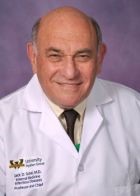
The Liaison Committee on Medical Education, the accrediting body for North American medical schools, has continued its full accreditation of the Wayne State University School of Medicine through the 2022-23 academic year.
The LCME notified WSU President M. Roy Wilson and School of Medicine Dean Jack D. Sobel, M.D., of the full accreditation continuation via a letter received Oct. 19.
"This achievement -- the result of untold hours of commitment by many of our faculty, students staff and administrators -- is worthy of celebration and congratulations," Dean Sobel said. "Throughout this process we have adopted and engaged in a culture of continuous quality improvement, and that will continue. We are committed to a process of continuous review that strives to provide the highest quality education through the most effective means."
The LCME, the accrediting body for 134 American medical schools in the United States, made a routine reaccreditation visit to the School of Medicine in the summer of 2015. In its review, the committee found the school not in compliance of some standards, including a lack of diversity in the student body and lack of independent and active teaching in the curriculum. While remaining fully accredited, the school received a "warning with accreditation" and was given two years to address areas of concern.
Since that time, Dean Sobel said, "A cadre of devoted individuals, led by Dr. Richard Baker (vice dean of Medical Education) has been working tirelessly to redesign and launch a new culture to provide the best student experience possible so that our graduates can indeed transform the promise of equal health care into a reality for all. Today, the LCME christened that culture."
The LCME's initial report noted that the incoming class in 2014 contained only five African-American students and two Hispanic/Latino students and 43 students from socio-economically disadvantaged backgrounds. There were no Native American students. The four categories are identified by the Association of American Medical Colleges as segments underrepresented in medicine. This year's new class includes 33 African-American students, 25 Hispanic/Latino students, five Native American students and 65 students from socio-economically disadvantaged backgrounds.
With the assistance of medical students, the school has adopted a culture of data-driven decision making and continuous quality improvement.
"Student participation in assessment and planning brings intangibles to an institution like transparency and accountability. Student input is highly relevant, and keeps our institution abreast of the cultural and technological shifts that are perpetually ongoing in a city like Detroit," said Brian Sullivan, a third-year medical student who served on the LCME Steering Committee. "Throughout this process, School of Medicine administrators, faculty and staff understood this and ensured that we played a key role in the transformation."
New initiatives throughout the school continue to be reviewed and implemented in accordance with the standards set forth by the LCME to better prepare students for residencies and their future careers in the field. These include:
• Integrated service-learning opportunities in the Year 1 curriculum as part of the new Patient, Population and Physician course.
• Increased independent study time in Year 1 and Year 2 by reducing lecture hours and refocusing lecture content.
• Instituted a holistic admissions review process in an effort to create a more diverse and inclusive environment.
• Overhauled admissions recruitment efforts and strategies to better engage, support and connect with a diverse applicant pool.
• Expanded the Office of Diversity and Inclusion to ensure all students have the resources needed to apply to and attend medical school.
• Established the Office of Enrollment Management Services, connecting Admissions, Records and Registration, and Financial Aid to serve student needs at all levels.
• Developed the Office of Learning and Teaching to help students with STEP 1 examinations and better prepare them for residencies.
• Changed the grading system for Year 1 and Year 2 to a pass/fail system.
• Created learning communities for incoming students to learn and train in cohorts from day one through graduation.
It is important to note, Dean Sobel said, that the school was always fully accredited, and that the LCME never questioned the quality of medical education provided. In fact, WSU medical graduates continued to exceed the national match rate for residencies and remained in high demand by hospitals across the nation.
Noting that the School of Medicine celebrates its 150th anniversary in 2018, Dean Sobel thanked those who worked to achieve this accomplishment, saying "you have laid the foundation for our school's next 150 years."